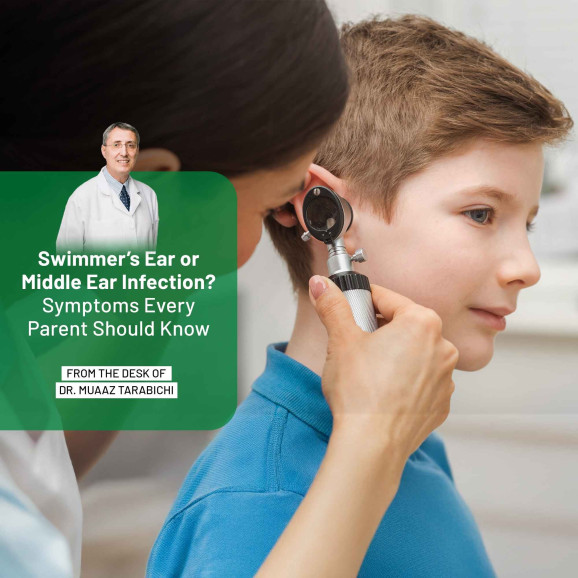Swimmer’s Ear or Middle Ear Infection? Symptoms Every Parent Should Know
Contact Us
It’s a sunny afternoon and your child has just returned from the pool, all smiles and laughter. But by evening, they’re tugging at their ear, wincing in pain. Is it just water trapped inside or something more serious?
Understanding the difference between swimmer’s ear and a regular ear infection is essential for timely and effective treatment. While both cause discomfort and sometimes hearing trouble, they affect different parts of the ear, have different causes, and require different care.
Tarabichi ENT, home to the best ENT doctors in Dubai, helps families identify ear issues early to ensure a quick recovery and prevent long-term problems.
What is Swimmer’s Ear?
Swimmer’s ear, medically known as otitis externa, is an infection of the outer ear canal. It often develops when water gets trapped inside the ear after swimming or bathing. This moisture creates a warm environment where bacteria or fungi can thrive, especially when protective earwax is washed away.
While children and frequent swimmers are most at risk, anyone can develop this painful condition.
Common causes include:
Prolonged water exposure, cleaning the ear with cotton swabs or fingernails, small cuts inside the ear canal, excessive earwax buildup, and skin conditions such as eczema.
Typical symptoms are:
- Redness and swelling of the outer ear
- Itching inside the ear canal
- Pain when moving or touching the ear
- Fluid or pus draining from the ear
- Muffled hearing or a feeling of blockage
What is a Regular Ear Infection?
A regular ear infection, or otitis media, affects the middle ear the space behind the eardrum. It often develops after a cold, sinus infection, or allergies that cause fluid buildup and block the Eustachian tubes. This trapped fluid can become infected with bacteria or viruses.
These infections are especially common in children because their Eustachian tubes are shorter and more horizontal, making drainage more difficult.
Common signs include:
- Deep, throbbing ear pain
- Fever, irritability, and restlessness
- Difficulty sleeping, especially when lying down
- Fluid behind the eardrum (sometimes visible to a doctor)
- Temporary hearing loss
- Nausea, vomiting, or diarrhea in younger children
Swimmer’s Ear vs Regular Ear Infection – How They Differ
While the symptoms may feel similar, there are clear differences that can help you tell them apart.
- Location of the infection: Swimmer’s ear affects the outer ear canal, while a regular ear infection occurs in the middle ear.
- Cause: Swimmer’s ear often follows water exposure or ear canal injury. Regular ear infections usually follow colds, flu, or allergies.
- Pain pattern: Pain from swimmer’s ear worsens when the outer ear is touched or pulled. Middle ear infection pain is deep and may intensify when lying down.
- Fluid drainage: With swimmer’s ear, fluid or pus is common. With a regular ear infection, drainage usually happens only if the eardrum ruptures.
- Impact on hearing: Both can cause temporary hearing loss — swimmer’s ear from swelling, regular ear infections from trapped fluid.
- Treatment: Swimmer’s ear is typically treated with antibiotic ear drops and keeping the ear dry, while middle ear infections may require oral antibiotics and, in chronic cases, ear tubes.
Identifying the Cause at Home
If your child is complaining of ear pain, a few questions can help narrow down the cause:
- Did the pain start shortly after swimming or bathing?
- Does it worsen when the ear is touched or the earlobe is pulled?
- Has your child had a recent cold or flu?
- Are there other symptoms such as fever, loss of appetite, or congestion?
Swimmer’s ear often presents with redness and swelling on the outside of the ear, while a regular ear infection may not have visible changes but is accompanied by fever or respiratory symptoms.
If you’re unsure, seeing the best ENT specialist in Dubai ensures an accurate diagnosis and fast relief.
Treatment Options at Tarabichi ENT
Our approach is tailored to the type and severity of the infection.
For swimmer’s ear, treatment may include:
- Antibiotic ear drops to eliminate bacteria
- Anti-inflammatory drops to reduce swelling
- Pain-relief medication
- Instructions to keep the ear dry during recovery
For a regular ear infection, we may recommend:
- Oral antibiotics for bacterial infections
- Pain-relieving medicines
- Tympanostomy tubes for children with recurrent infections
- Monitoring to ensure fluid behind the eardrum clears completely
Getting care from the best ENT surgeon in Dubai ensures that infections are treated effectively and complications are avoided.
How to Prevent Ear Infections
Most ear infections can be reduced or avoided with preventive care:
- Dry ears thoroughly after swimming or bathing
- Avoid inserting objects like cotton swabs into the ear canal
- Use protective earplugs for frequent swimmers
- Manage allergies and nasal congestion early
- Keep vaccinations up to date to reduce respiratory infections
At the best ENT clinic in Dubai, our specialists can guide you with personalized prevention tips for your family.
When to Seek Medical Help Immediately
Don’t wait to see if the pain will pass. Call a trusted ear doctor in Dubai right away if your child experiences:
- Severe pain lasting more than 24–48 hours
- High fever
- Sudden hearing loss
- Persistent discharge from the ear
- Swelling spreading beyond the ear
Early Action Matters
Whether it’s swimmer’s ear after a day in the pool or a middle ear infection following a cold, quick action makes a big difference.
- Pain and redness in the outer ear after swimming? Likely swimmer’s ear.
- Deep pain with fever after a respiratory illness? Likely a regular ear infection.
At Tarabichi ENT, the best ear doctor in Dubai can quickly identify the cause and start treatment right away, ensuring your child’s ear health is restored and future problems are prevented. Our our team of the Best ENT doctors in Dubai, at Tarabichi Healthcare is committed to delivering world-class care with precision and compassion.
Meet our dedicated specialists: Dr. Muaaz Tarabichi, Dr. Michael Timms, Dr. Mustafa Kapadia, Dr. Satish Jain and Dr. Jamal Kassouma.
We provide minimally invasive treatments tailored to your condition, with a strong focus on safety, accuracy, and long-term results.
For Consultations and Appointments, reach out to us at




